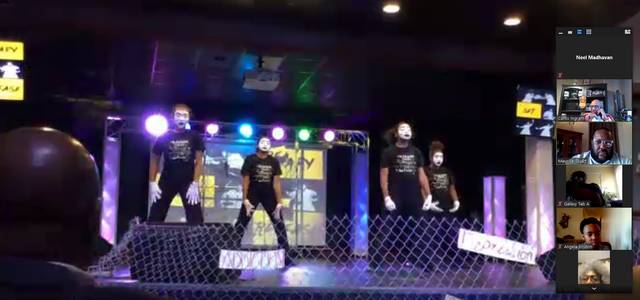
A video of a dance group performance plays during the virtual MLK weekend youth extravaganza Saturday morning.
ROCKINGHAM — The Martin Luther King Celebration Foundation of Richmond County found a way to adjust the format of their events this year to celebrate the life of King while social distancing by taking the traditions virtual.
On Saturday, to kick off the MLK weekend’s virtual festivities, the Foundation’s governing committee held a virtual prayer breakfast and youth extravaganza.
A Rockingham Middle School student opened the youth event with a prayer, and then videos of songs and dances that were submitted by local youth were played for those viewing. A Richmond Senior High School student and Amiya Griffin, a student at North Carolina A&T, each recorded videos of themselves singing gospel songs, while minister Patrick Ellerbe recorded himself performing an interpretive dance.
Youth extravaganza chair Angeline David said she was thankful for what she’d seen and heard during the performances.
Over 100 people tuned into the Foundation’s virtual panel discussion on racial justice issues Monday, also held via Zoom. This year, the Foundation Committee decided to not have one speaker, but rather a panel discussion addressing pressing issues in the African-American community. Kimberly Harrington, who served as the moderator, said she hoped the conversations would “inspire, uplift and serve as a catalyst for positive change, in our selves and in our relationships with one another.”
“Let us remember that when we celebrate Dr. King, we also celebrate the many people who made Dr. King possible, the maids, porters, sanitation workers, Freedom Riders and many others who unselfishly followed Dr. King’s movement of nonviolence,” host Bruce Stanback said.
The event began with a rendition of “Lift Every Voice and Sing.” A moment of silence was held for Rev. James Smith Jr. and there was an opening prayer from Outreach for Jesus Pastor Marvin Taylor. A sixth grade student at Ellerbe Middle School recited his own version of the “I Have a Dream” speech prior to the panel.
Marchell Adams-David, the first woman and first African-American to hold the post of city manager in Raleigh, discussed her history as a public servant and experience with systemic racism and microaggressions.
She discussed being in a room where nobody looked like her. She shared her experiences of coming to into a job with the same competencies and capabilities of everyone else, yet people questioned her on how she got to her position. People often said to her, “You’re very articulate” and “You’re not like the rest of them.”
Adams-David, now in her 50’s, said crossing that benchmark in life has reinvigorated her to become more bold. She used to be very cautious and purposefully avoided making people feel uncomfortable. Now, she wants to hold others, and herself, more accountable.
“I am a firm believer that we are going to be judged by how we treat others and how we are able to put others in positions of power and authority,” Adams-David said. “You find somebody who has that spark, who wants to work hard, you try to bring that person forward. Once you make it to the top floor, take the elevator back down and bring somebody back up with you.”
She also discussed her success of making Juneteenth, the celebration of emancipation for those who had been enslaved, a paid, national holiday in the city of Raleigh.
Angela Medlin discussed her experience as a successful entrepreneur and as a Black woman in the apparel industry. Growing up, she always knew that her future involved her being creative and making art. She talked about the difficulties of hearing “no” as a young artist.
“I was told that I couldn’t possibly be that good,” Medlin said. “I had to have traced something or it didn’t come from me. We all know what direction that came from. But that didn’t stop me.”
Medlin opened up about the difficulties of existing in two different worlds – one with her Black friends and family, and a world composed mostly of white people.
“I was the only African-American in the design department,” Medlin said. “It wasn’t until I was in a position of leadership that I could bring other people of color into the companies. It was not a popular thing for black women to be apparel designers for some of these global companies.”
Educator and ally of social justice Keith Parsons talked about why he became a teacher later in his career. He received an email from a friend he respected in 2008 talking about how Barack Obama was the Bible’s definition of the Antichrist. Parsons said that he was “flabbergasted” by this, and wanted to pursue a career path where he could guide other’s education in a way that didn’t promote ignorance.
“I decided that if I teach, I can help the young people in our community find their versions of truth and make sure that truth is based in reality and not some crazy conspiracy theory,” Parsons said.
Parsons talked about how he wants to make school enjoyable and relevant to every student regardless of their background. He described the difficulty of an African-American girl in his Civics class asking, “When are we going to talk about people who look like me who aren’t slaves?”
“Your truth might not be the same as mine,” Parsons said. “Let’s just make sure that it’s based in reality.”
The final panelist, Commissioner Tavares Bostic, who is a clinical social worker, established a timeline of African-Americans in this country. From the arrival of slaves in America in 1619, to the Emancipation Proclamation in 1863 and ratification of the 13th amendment in 1865 that abolished slavery, through the Jim Crow era to the Civil Rights Movement in the 1960s, Bostic asserted that black people have only technically been free since 1970.
Bostic discussed the difficulty of being an educated Black man, but still being fearful in certain situations.
“When we try to do things peacefully, it’s not enough,” Bostic said. “It seems like no matter what we do, it’s still the wrong thing.”
Bostic compared the recent storming of the U.S. Capitol to an experience he had a few years ago with his Black friends in D.C. They were traveling up the stairs of the Capitol, while wearing suits, and were greeted by police before they could make it halfway up.
“We have to be able to call out hypocrisy when we see it, we have to be able to say that wrong is wrong in this situation where you see black and brown people going to jail disproportionally more than any other race,” Bostic said.
A few questions from the audience were then shared with the panelists.
“This is a great representation of Richmond County and the excellence that comes from the county,” Harrington said.
As the event came to a close, Dobbins Heights Mayor Antonio Blue encouraged individuals to do something good to invoke the vision of Dr. King for everybody.
MLK Foundation committee chairman Curtis Ingram concluded the event with a moment of silence for individuals suffering from COVID-19. Every individual in the audience was then invited to unmute themselves and join in a verse of “We Shall Overcome.”
Neel Madhavan contributed to this story.
Reach Matthew Sasser at 910-817-2671 or msasser@www.yourdailyjournal.com.






